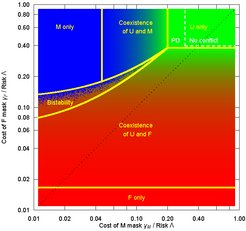Infection control according to own interest
A model weighs individual costs and social benefits of interventions during the Covid-19 pandemic
During the pandemic, governments imposed strict restrictions on everyone. However, the acceptance of these measures was not the same for everyone. Researchers now propose a model to assess this situation, depending on the protection the measure provides, the risk of infection and the cost of the measure. The model shows that different assessments of risks and costs can lead to different ways of dealing with the situation.

Due to the Covid 19 pandemic, governments imposed severe restrictions on everyone: schools were closed, businesses were no longer allowed to operate, and travel restrictions were meant to contain or slow down the spread of the virus. Gradually, however, this responsibility was shifted back to the individual. Many wonder whether they should follow the current voluntary measures, such as wearing masks on public transport. Often, following such measures is in the interest of society, but is costly for the individual, for example.
Until now, there has been a lack of a clear framework for assessing the nature of such interactions - depending on the costs and benefits to the individual, but also on the status of the pandemic. Researchers at the Max Planck Institute for Evolutionary Biology in Plön and Princeton and Berkeley Universities propose a way to represent the conflict between individuals and society in such a context.
Individual and societal responses to an ongoing pandemic can lead to social conflict. In some cases, individuals are tempted not to follow a measure, even though following it would be best for society as a whole. However, as the level of regulation to reduce SARS-CoV-2 transmission is now very low in most countries, interventions are now driven by individual choices.
Act in own interest
The model focuses on three different examples of interventions, which, however, led to the most discussion during the pandemic. These include socialising, vaccination preparedness and wearing masks.
Assuming that individuals act in their own interest, a corresponding framework for action becomes necessary. Arne Traulsen, Department of Theoretical Biology at the Max Planck Institute for Evolutionary Biology, Simon Levin, Department of Ecology and Evolutionary Biology at Princeton University, and Chadi Saad-Roy, Lewis-Sigler Institute for Integrative Genomics at Princeton University, propose in their model how this situation can be quantified. This is done depending on the protection the intervention offers to a user and others, the risk of getting infected and the cost of the intervention. "We discuss when there is a tension between individual and societal benefits and which parameter comparisons are important to distinguish between different regimes of intervention use," says Arne Traulsen.
In particular, the model also shows that a different assessment of risks and costs can mean that it is completely natural, for example, for some individuals not to use masks, while others do so in exactly the same context. The model thus helps to better understand social conflicts.












